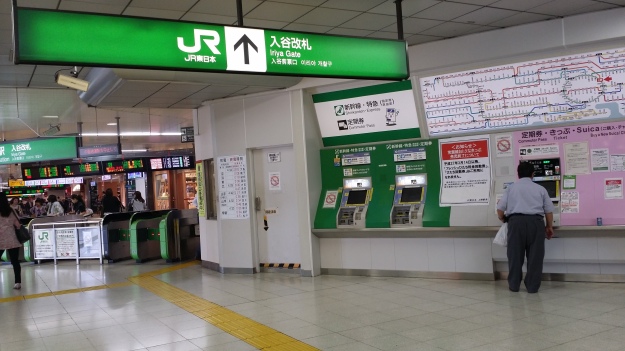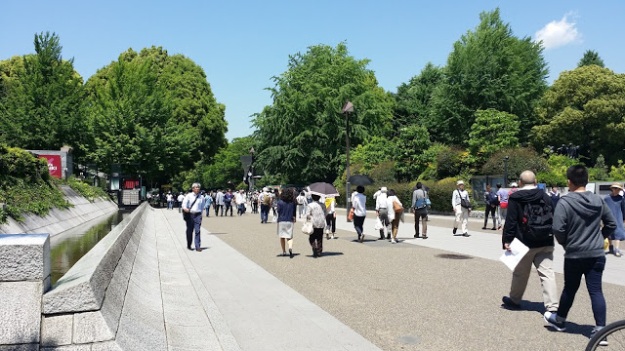June 18, 2018: A magnitude 6.1 earthquake shook Osaka and its neighbouring prefectures in Japan during the morning rush hour (just before 8AM in Japan), killing at least five people and injuring as much as 340 (NHK).
For a tourist in Japan, it might be a shock to encounter an earthquake during your stay. Since Japan is an extremely tourist-friendly country that welcomed more than 10 million international travellers in April 2018 alone (Japan National Tourism Organization), there are plenty of tourists currently in Japan at any given time, and while the chances of experiencing a strong earthquake during your stay may be slim, it’s not completely nil either.
Here’s what to do in the unfortunate case that you do.
-
Stay Calm and Collected
Earthquakes happen very frequently in Japan and locals may even regard minor tremors as normal. During my time in Japan, I experienced a 5.2 magnitude earthquake centred in Nagoya Prefecture myself (June 25, 2017). I felt the movement as I lay on my bed that morning, but the locals told me that it was quite a regular thing.
That said, the best way to react to an earthquake is to be calm and collected to be able to think clearly as to how to best respond to the situation at hand. Panicking will not do you any good.
Do not run for safety as the ground violently shakes as it will expose you to greater risk from falling debris and loosing your balance. Instead, you are advised to do the following based on where you currently are.
Indoors

-
Find the Nearest Good Spot
As soon as you feel an earthquake, look around your immediate surroundings and determine the nearest good spot from you. A good spot is one where things “won’t fall, won’t collapse, and won’t move.”
It may be under a table or mattress, or at the corner of two walls, as the furniture or walls may protect you from falling debris. It is also advisable not to go near any windows, mirrors, or shelves since broken glass or miscellaneous items may hurt you.
If you happen to be at a department or convenient store, be mindful and move away from showcases and items that might collapse on you or obstruct your path.
If you are at a subway station, it is best to stay next to the pillar and stay away from hanging signages that might fall on you.
-
Hide at the Good Spot
After you have decided on the best spot for you, crawl there (if necessary) and hide. Try to make yourself as small as possible by bending your legs to your chest, bending down, and placing your arms on your head. Always protect your head. If you have a shopping basket at hand, use it to cover your head. If not, you can use your hands.
If there is nothing to hide under or next to, or if it is too crowded (at the train station or tourist destination) simply crouch down with your hands over your head.
Stay in this position until the earthquake has completely ended. Be careful of the fallen items, broken pieces of glass, or hanging electrical cords as you evacuate to a safer location.
Outdoors

-
Get Indoors or Go to the Nearest Open Field
If you are at a busy street, it is safer to be indoors because it is harder to find a good spot to hide from objects such as glass, signages, and electrical lines falling. An entire buildings may also collapse. Get inside a new and sturdy building and do the aforementioned.
HOWEVER, the best place to be during an earthquake is at an open field such as a park as it eliminates any possible object that can hurt you. If you ever find yourself at one, simply stay put crouch down, and protect your head.
About Family and Travelling Companions
-
Look After Yourself First
The most natural thing for someone to do during an emergency such as an earthquake is to go gather the other family members or travelling companions together, BUT if you’re separated from one another, don’t go looking for the rest. That will place you at a greater risk as you head out in search of them.
Make sure that your other companions know and understand the importance of taking care of oneself first and foremost (with young children, if you have). If you all managed to successfully survive the ordeal, then you can meet up when the situation is stable and safe. But if you go look for the others, you might only get hurt in the process.
About Travel Itinerary
Aftershocks will continue to occur for around one to two weeks after an earthquake, so you may continue to feel minor tremors every now and then. If you are concerned about the frequency and the strength of these aftershocks, you can opt to move to a different region where the earthquake did not affect and create a new itinerary. Oftentimes, they are quite minor though unless it halts the public transportation.
About Language Concerns
Perhaps my biggest concern when an emergency hits while I’m in Japan is the language barrier. Being mainly fluent in English, I find it difficult to interpret what public announcements are saying as they are completely in Japanese. Announcements usually consist of important information or instructions, but as a tourist, you may be unable to understand it which might be a safety risk.
Unfortunately, there is no way to get around it other than observing what the locals are doing and following them, going to the nearest tourist assistance booth, being well-read about emergency situations, or contacting your respective embassy for more information. Reference material and contact numbers of foreign embassies are listed below for your use.
Reference Material
JNTO (Japan National Tourism Organization)
The Japan National Tourism Organization may establish a special website for tourists in Japan in the case of a disaster. The site offers information about disasters in English.
Official Website: http://www.jnto.go.jp/eng/
TEL: 03-3201-3331 or (+81)3-3201-3331 (International) *Japanese, English, Chinese, and Korean *Late night (17:00-09:00 in Japan: Japanese and English)
Disaster Preparedness Tokyo
A disaster prevention book that is available for free from the Tokyo Metropolitan government. Information about what to do in the case of an earthquake, things to be aware of, and emergency contact numbers are listed. The book is currently available for download in English, Chinese, and Korean.
Download: English・Chinese・Korean
Embassy Phone Numbers
(For top international visitors to Japan in alphabetical order)
*For international calls, remove the first 0 and include +81 in its place. (Example) (+81)3-3224-5003
Australia
Phone Number: 03-5232-4111
China
Phone Number: 03-3403-3380
France
Phone Number: 03-5798-6000
Germany
Phone Number: 03-5791-7700
Great Britain
Phone Number: 093-541-5605
Indonesia
Phone Number: 03-3441-4201
Philippines
Phone Number: 03-5562-1600
Russia
Phone Number: 03-3583-4224
Singapore
Phone Number: 03-3586-9111/2
South Korea
Phone Number: 03-3452-7611/9
Spain
Phone Number: 03-3583-8531/2
Thailand
Phone Number: 03-5789-2433
United States
Phone Number: 03-3224-5000
Vietnam
Phone Number: 03-3466-3311/3313/3314
Please check the website below for information on embassies of other countries.
Embassies and Consulates in Japan (http://www.mofa.go.jp/about/emb_cons/protocol/a-h.html)
Have a safe and fun time in Japan.
…
faith
(Featured photo from NDTV)

